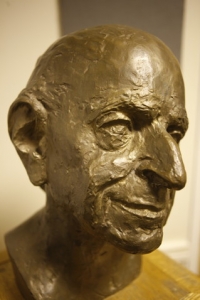During a trip to London in 1935, the Viennese philosopher of science, Karl Popper, met F. A. Hayek. Hayek, an economist and fellow Austrian, invited Popper to give a talk at LSE the following year. Ten years later, in 1946, Popper would take up a permanent position at the School.
Karl Popper was born into a family of Jewish descent in 1902. By the mid-1930s, fearing the rise of Nazism and the threat of the Anschluss, Popper started work on his first book, The Two Fundamental Problems of the Theory of Knowledge, the publication of which he hoped would lead to his being offered an academic position away from the dangers of central Europe.
At the end of 1936, with support from Bertrand Russell, G.E. Moore, Susan Stebbing and from scientists like Niels Bohr, Popper was appointed to a position as the sole lecturer in Philosophy at Canterbury University College, Christchurch, New Zealand.
Whilst in New Zealand, Popper had begun writing his magnum opus, The Open Society and its Enemies, and on 26 April 1943 (two months after its completion) he again made contact with Hayek, with whose help it was accepted for publication by Routledge by mid-March 1944.
As well as helping with its publication, Hayek had shown copies of The Open Society to such LSE luminaries as Harold Laski, Morris Ginsberg, Lionel Robbins and Alexander Carr-Saunders (the then Director), who were at that time searching for a replacement for Abraham Wolf as Chair of Logic and Scientific Method. Sufficiently impressed by the manuscript, Carr-Saunders et al. acted on Hayek’s suggestion of converting Wolf’s part-time chair into a full-time readership, which was offered to Popper on 8 December 1943.
For the next 18 months Popper remained in New Zealand, working on The Poverty of Historicism (which had grown out of the talk he gave at LSE back in 1936) and finalising The Open Society for publication. He continued teaching at Canterbury University College until the end of the academic year 1944/5.
Popper’s appointment at LSE was dated 1 October 1945, and announced in the 1944-45 Director’s Report – though it was known that he wouldn’t arrive until sometime later. The Open Society was published in London in November 1945, just before the Poppers set sail from Auckland on 5 December.
Popper arrived in London on 5 January 1946 and began his lectures the following week. LSE Philosophy was born.
We’re grateful to Brian Boyd for providing the finer details of Popper’s movements during 1936–1946.




Connect with us
Facebook
Twitter
Youtube
Flickr